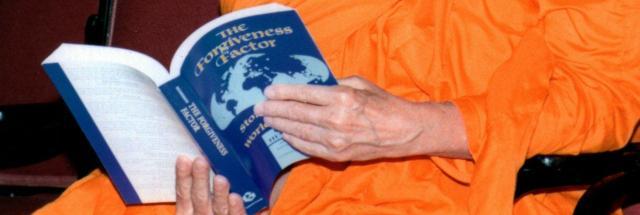KBOO 1 March 1990
I have not yet had the chance to meet Irina Ratushinskaya, a leading writer of her generation in the Soviet Union, but I am fortunate to have an autographed copy of her book ‘Grey is the Color of Hope.’ For some reason this stirring account of her life in a Soviet Labor Camp – where she was imprisoned for her poetry when she was only 28 years old and nearly died from maltreatment and the hunger strikes she endured to call attention to the abuse of human rights – has not yet caught on here. In Europe it is a best seller, with more than 70,000 sold in Sweden alone. The London ‘Sunday Times’ made the book its ‘paperback of the year.’ Its reviewer wrote, ‘‘Serene as well as defiant, Ratushinskaya’s memoir is a classic of its kind. She illustrates the fundamental human appetite for song, for the freedom of spirit it asserts and its power to make light of brute authority. What distinguishes her book is its clear-sighted perception that the apathy induced by oppression is what kills the root of the soul and guarantees evil its success.’
From reading its most excellent English translation you really get a sense of this indomitable woman and her irrepressible spirit. Irina had received the longest sentence for political crime of any woman since the days of Stalin – seven years of hard labor to be followed by five years of internal exile. After four years she was released under pressure from the West just before the Reykjavik Summit in 1986. But she refuses to hate. Reviewing the book in ‘Christianity Today,’ Ellen Santilli Vaughn writes, ‘Her story is much more about freedom than confinement: a freedom born of hope, trust in the will of God, and refusal to yield to the will of oppressors. And that, in the end, is why Irina Ratushinskaya could offer her KGB escort a cup of Russian coffee the day she came home from prison.
A friend of mine has recently taken her on a tour of British schools where the enthusiastic response to her convictions surprised everyone. She would speak for eight to ten minutes and then field a flood of questions. One boy asked her why she hadn’t signed the piece of paper asking for ‘pardon’ and then resumed her activities once free. ‘Because,’ she said, ‘the first little compromise may seem a little one but once you start it changes you. It always leads on to bigger ones.’
In her book she pays generous tribute to Alexander Solzhenitsyn. ‘Thank you for your priceless counsels,’ she says to him. ‘Who can say whether Igor and I would have had the presence of mind to burn all letters and addresses while the KGB hammered on our doors, had not we read your works? Or would I have been able to summon sufficient control not to bat an eyelid when they stripped me naked in prison? Without you, would I have grasped that cardinal principle for all prisoners of conscience: ‘Never believe them, never fear them, never ask them for anything?’’
Since her arrival in the West, Irina says, people frequently express surprise at her ability to recite her poetry from memory and at the ease with which she answers questions. She points out that this is because her first large audiences were other prisoners crammed into carriages where not everyone could see her, only hear her voice. Poetry had to be read in as straightforward a manner as possible and the questions answered simply, without trying to be clever, as she says she now does in English. She describes how at every transit stop she tried to resurrect the full index of her poems. With everything confiscated only memory could protect her poetry.
Irina is a humble person. At one point she writes, ‘Thank you, Lord, that it fell to my lot to endure the rigors of prison transports, to hide poetry and books from the KGB, to languish in punishment cells and starve. Only when I entered into open combat did I realize how much help I received from almost everyone I encountered. So many different hands, young and old – slipped us bread when we were exhausted by hunger, so many different eyes smiled at us –grey, brown, blue. And in the wondrous realization that they were on our side, and not on the side of our tormentors, I shed my youthful pride, and the arrogance which might have destroyed my soul melted away.’ Indeed, one of her poems reads, ‘I think you, rusty prison grating, and you, sharp, glinting bayonet blades. For you have given me more wisdom than learning over long decades.’
Irina and husband, Igor, an artist and engineer, now live in London. They travel a lot and are engaged in the work for human rights. She would prefer to be writing. But she says that only when the last political prisoner is released in her country will they be happy to shut up and rest a bit. ‘But we have no right to do so before that,’ she says. She has a new book coming out in the spring entitled ‘In the Beginning.’ It is about finding faith in an atheistic society. ‘My teachers told us over and over again there was no God,’ she says. ‘Because they felt they had to keep telling us, I knew he must exist.’
Edward Ericson, author of ‘Solzhenitsyn – the Moral Vision,’ writes, ‘My reaction to this couple was much the same as my reaction to Solzhenitsyn and his family when I met them. Here are cultured Eastern Europeans who have become the more refined for the crudities visited upon them. Here are persons of capacious soul and sharp insight, of unshakeable dignity and enormous integrity. There simply cannot be many who are their moral betters.’
:

